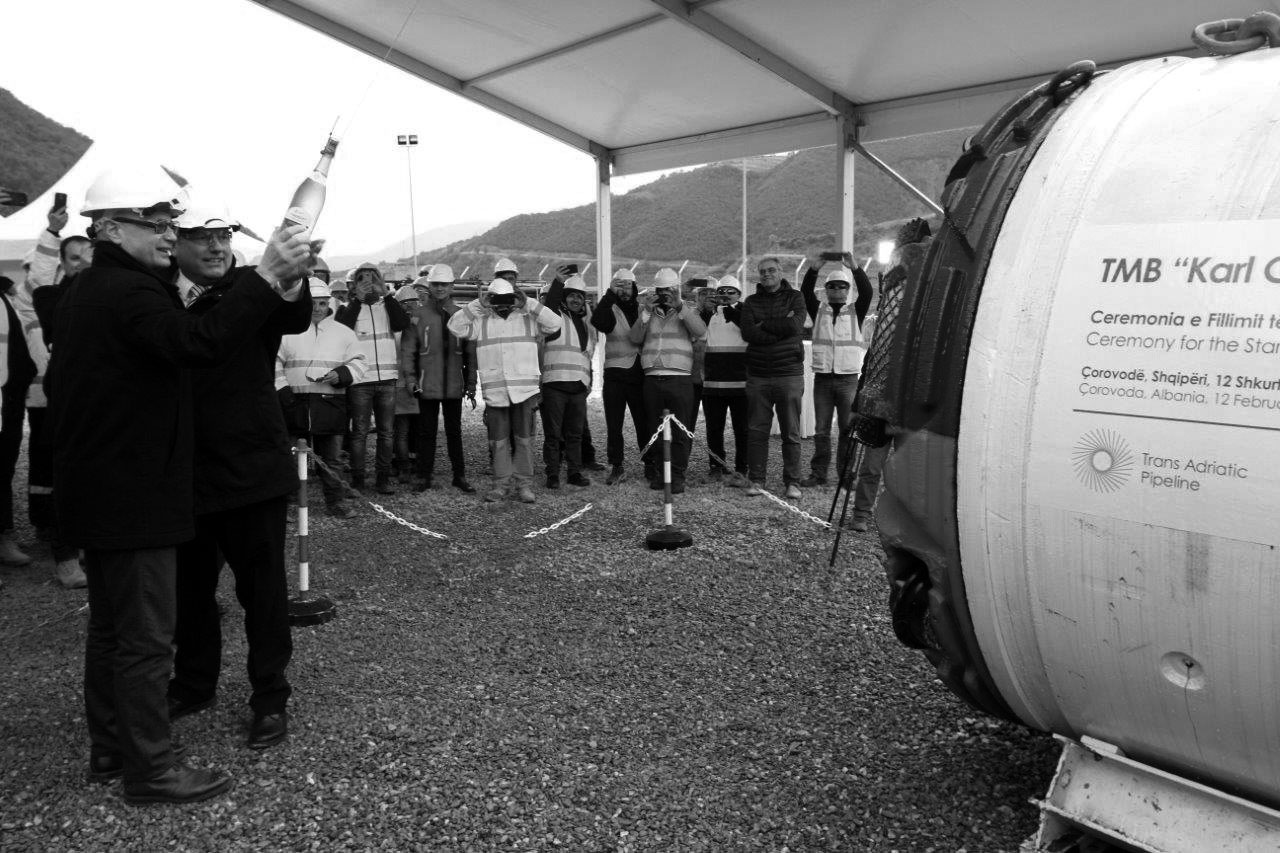Trans Adriatic Pipeline 2/3 completed
The Trans Adriatic Pipeline (TAP) is now two thirds completed. This includes all engineering, procurement and construction scope, announced TAP Managing Director Luca Schieppati at the 4th Southern Gas Corridor (SGC) Advisory Council in Baku, Azerbaijan.
The high-level event, organised under the auspices of Ilham Aliyev, the President of the Republic of Azerbaijan, brought together the Vice President of the European Commission in charge of Energy Union Maroš Šefčovič, as well as several Ministers and government officials from TAP’s host countries and beyond. They underlined TAP’s key contribution to diversifying and securing Europe’s energy mix and reinforced their commitment to the timely implementation of the project.
Luca Schieppati presented TAP’s achievements and progress as of end-January 2018, as follows:
- TAP remains on track to deliver world-class health and safety performance across Greece, Albania and Italy. The TAP teams have collectively worked over 23 million manhours and driven approximately 65 million kilometres without a major incident.
- TAP’s contractors have cleared approximately 92% of the project route in Greece and Albania (700km out of 765km). Also, over 67% of welded steel pipes are already laid in the ground (backfilled), while almost 400km (over 51%) are reinstated.
- In Italy, works are ongoing in the micro-tunnel area: following the completion of the temporary road and the area preparation, the digging of micro-tunnel pit is currently under way.
- All 55,000 pipes have been received in Greece, Albania and Italy.
- More than 5,800 people are currently working for the project across TAP’s host countries – over 85% of which are employed locally.
- TAP has implemented a wide range of social and environmental investment (SEI) programmes in the communities along its route. In total, Trans Adriatic Pipeline will invest over EUR 55 million in SEI in Greece, Albania and Italy.
“In parallel with construction activities, we are also focusing on commercial and operational readiness, ensuring that TAP will provide the best services and flexibility to its customers,” TAP’s President Walter Peeraer stated.
“I am pleased to confirm that, nearly two years since construction started, the Trans Adriatic Pipeline project remains on schedule. Benefiting from the continued support of all parties involved, we are confident that Trans Adriatic Pipeline will be operational in early 2020, bringing much-needed gas supplies to support Europe’s transition to a more secure, diversified and sustainable energy mix,” he added.
Trans Adriatic Pipeline is committed to responsibly delivering a world-class project along its entire length in Greece, Albania and Italy. Trans Adriatic Pipeline continues to work to complete this strategic project safely, avoiding or minimising impact on the environment and the hosting communities.
Trans Adriatic Pipeline will promote economic development and job creation along the pipeline route; it will also be a major source of foreign direct investment. With first gas sales to Georgia and Turkey targeted for late 2018, first deliveries to Europe will follow in 2020.
Starting works on a 1.5 km micro-tunnel in Albania
On 12 February 2018, the Trans Adriatic Pipeline, organised a ceremony to mark the start of works for the 1.5-kilometre micro-tunnel, which will connect the east and the west segments of the pipeline in Albania.
The ceremony held at the TAP construction site, where the boring of the micro-tunnel will commence, was attended by the Deputy Minister of Infrastructure and Energy, Enis Aliko; the Mayor of Skrapari, Nesim Spahiu; Trans Adriatic Pipeline Project Manager for Albania, Karl Roberts; Spiecapag Project Manager, Guillaume Batut; Bessac Project Manager for Çorovoda micro-tunnels, Dylan Mognol, and other representatives of the energy sector in Albania.
Skrapar’s landscape poses many challenges to the pipeline construction, given the mountainous heights, the geological composition and the difficult terrain with numerous steep slopes. The micro-tunnel will enable the pipeline to bypass the Osumi River and a new road. It is the safest and most environmentally friendly option for crossing this challenging mountainous segment.
On this occasion, the Deputy Minister of Infrastructure and Energy, Enis Aliko, stressed the importance of the Trans Adriatic Pipeline project for the Albanian economy: “It is the first time that this kind of operations and techniques are executed in Albania, part of an important project such as Trans Adriatic Pipeline. Moreover, I would like to congratulate Trans Adriatic Pipeline on the safety standards applied during the construction of the pipeline.”
“TAP is a key project part of the Southern Gas Corridor, enabling the future gasification of the Western Balkans and bringing a new source of gas to Europe. The micro-tunnel will be constructed using state-of-the-art technology with minimal human intervention, making it the safest method for the environment,” Trans Adriatic Pipeline Project Manager for Albania, Karl Roberts, added.
In his welcoming speech, Spiecapag Project Manager Guillaume Batut, said: “So far, with the support of the Albanian Government and all the Municipalities along the TAP route we have managed to overcome all challenges. I have no doubt that with the same support for Trans Adriatic Pipeline, Spiecapag and Bessac will successfully complete the micro-tunnel project.”
The Mayor of Skrapari, Nesim Spahiu, mentioned the importance of Trans Adriatic Pipeline investments for the region: “Trans Adriatic Pipeline is one of the most important investments in Albania and for the Skrapari region. It has an enormous contribution, especially for road infrastructure, employment and social and environmental investments. The Skrapari Municipality has a very good relationship with TAP and TAP’s contractors, always finding solutions for the local community.”
The micro-tunnel will be comprised of a 560-metre East tunnel and a 600-metre West tunnel and it will have a 1.8 metre diameter. The construction works for the micro-tunnel are expected to last approximately four months and about 50 more new jobs will be created locally.
The tunnel boring industry tradition requires that every tunnel boring machine is given a name. Thus, Trans Adriatic Pipeline decided to name the boring machine ‘Karl Gega’, in honour of one of the most renowned infrastructure and transport engineers in Europe.
KEY FACTS AND FIGURES ABOUT TAP’S MICRO-TUNNEL IN ÇOROVODA
Çorovoda Micro-Tunnel
- Overall length of the micro-tunnel is approximately 1.5 km.
- Length of East tunnel is 560 metres.
- Length of West tunnel is 600 metres.
- Internal tunnel diameter: 1.8 metres (1,800 mm).
- The geology of the terrain is mainly rock (Flysch).
- Construction works will last approximately 4 months (2 months of excavation for each tunnel), and will be arranged around 24h work shifts.
- Local employment: approximately 50 workers from Çorovoda.
Micro-Tunnel Boring Machine (MTBM)
- Name of the MTBM: ‘Karl Gega’.
- Type of MTB Machine: slurry MTBM.
- Excavation diameter: 2.2 metres (2,225 mm).
- Total weight of the MTBM: 74 tonnes.
- Total length of the MTBM: 12.5 metres.
- Jacking force: 1,400 tonnes.







